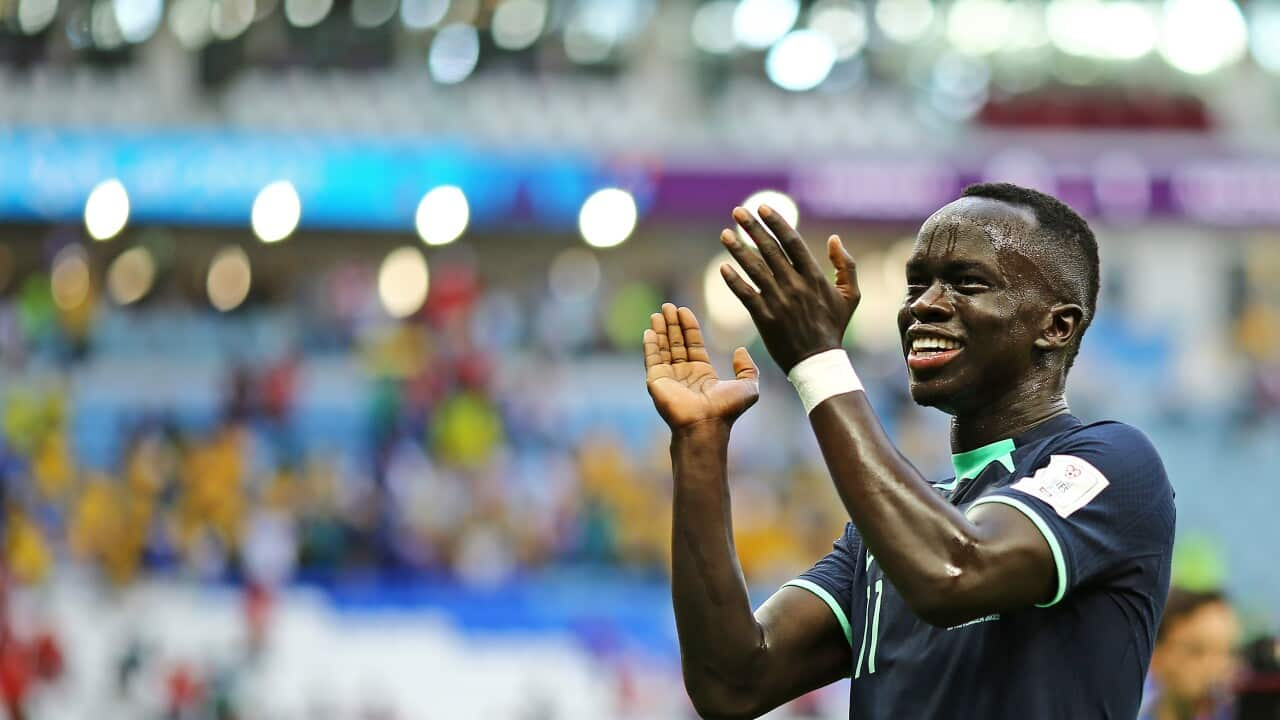Highlights
- Socceroos star Awer Mabil is the 2023 Young Australian of the Year.
- He grew up in a Kenyan refugee camp after his family fled civil war in South Sudan.
- Mabil says football is a platform for him to be himself and help others.
From a refugee camp to Socceroos stardom and founding his own charity, 2023 Young Australian of the Year Awer Mabil has made it his life's mission to "stand for something that is meaningful that can help others".
Growing up playing football on the dirt pitch at Kenya's Kakuma refugee camp after his family fled civil war in South Sudan, Mabil came to Australia when he was 10 years old and fulfilled a childhood dream of becoming an international footballer.
The Socceroos star was celebrated nationally , and on Wednesday,
Unable to attend the ceremony due to overseas football commitments, Mabil's mother and uncle received the award on his behalf.
"It hasn’t sunk in yet. For me, it was an honour just to be nominated," the 27-year-old said later that night from Prague, where he is currently based with new club AC Sparta Prague.
Mabil said while "football is everything," being "a good person" always comes first.
"For me, what comes first is to be a good person. It always meant a lot to me to always go back to the refugee camp where I was born to try to be there for the kids ... to make the kids realise that they can make it," he said.
The winners of this year's awards. Professor Tom Calma was awarded Senior Australian of the Year, and Taryn Brumfitt is Australian of the Year.

Prime Minister Anthony Albanese presents the 2023 Young Australian of the Year winner to Awer Mabil's mother Agot Dau Atem and uncle Michael Matiop in Canberra. Source: Getty / Martin Ollman
'Football was a saviour for me'
Mabil first learned to play football on the dirt pitch at the Kakuma refugee camp where he was born.
He spent the first 10 years of his life there before coming to Australia where he went on to play for Adelaide United and clubs around the world.
In Mabil recalled making footballs out of plastic bags, clothes and balloons.
“If you want just a normal small ball, you get plastic bags and wrap them around, burn it a little so it glues, and that’s what you use to play," he said.
Arriving in Australia with no English, he said he used football as a way to communicate.
"It was tough at the start, because we came here and didn't speak any English at all," he said.
"Football was like a saviour for me and it was a way I could communicate.”
"As a young child coming out of a refugee camp and coming into this world, trying to build his career in football, that was not an easy thing,” his brother Awer G. Bul said in a pre-recorded interview on Wednesday night.
Mabil made his senior debut for Adelaide United in 2013 against Perth Glory.

Awer Mabil of Australia gestures prior to the FIFA World Cup Qatar 2022 Round of 16 match between Argentina and Australia in Doha, Qatar. Source: Getty / DeFodi Images
'He sends them hope'
Mabil and his brother always intended to revisit their past. Together, they returned to the refugee camp in 2014 with two suitcases full of donated jerseys and footballs.
"I went back there and gave those out. And then I realised that kids were playing barefoot," he said.
Back home, Mabil embarked on a mission to do more, collecting football boots from his teammates.
"From there, Barefoot was born," he said.
Mabil and his brother co-founded the not-for-profit organisation Barefoot to Boots, which aims for better health, education, policies and gender equality for refugees. It provides sports footwear and medical equipment for the South Sudanese refugee camp.
Mabil said his proudest achievement was donating incubators to a camp hospital. "That for me means the world, because we've given a life with a simple thing," he said.
His brother said the organisation was born from an idea to "enlighten the life of refugees wherever they are".
"If you can have a feel for a real ball that people play football in the big arena, it already gives them an automatic feeling that they just don’t belong to the camp; they also belong to the other part of the world," he said.
"A refugee child sitting somewhere watching Mabil, it would have been big things to them. He sends them hope."
Mabil said being named Young Australian of the Year gives him power to continue his work.
"For me, I love to help people. I’m really motivated to continue to build on from this," he said.
"Football allows me to be myself but also stand for something that is meaningful that can help others."










